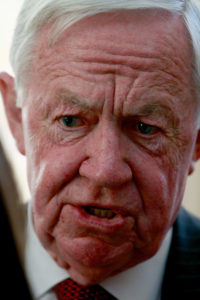The struggle between the forces of segregation and civil rights in the South was the big story when the Nieman Fellows came together in September of 1962. The class was heavy with Southern (white) journalists who had been covering it. I suspected that my inclusion reflected a misapprehension on the part of the selection committee that Indianapolis, where I had been editorializing, was in the South.
Into this group walked that year’s South African fellow, Allister Sparks, who had been covering apartheid, its excesses and discontents. It was a perfect fit. Discussions raged comparing the two situations, trying for each  country to distinguish the particular from the universal. There was much talk of W.J. Cash’s classic book, “The Mind of the South.” This made such an impression on Allister that he wanted to render the same service to his own country, and almost three decades later did, with “The Mind of South Africa.”
country to distinguish the particular from the universal. There was much talk of W.J. Cash’s classic book, “The Mind of the South.” This made such an impression on Allister that he wanted to render the same service to his own country, and almost three decades later did, with “The Mind of South Africa.”
Allister had done his spell in London, and could enlighten us on the differences in folkways of ourselves and the denizens of Fleet Street. Some years later, when I became London correspondent for the Baltimore Sun, working on Fleet Street, I realized how his insights had helped prepare me.
Allister was always eager to absorb all he could of American life. We were invited to witness a Harvard football game (Yale, of course) from the press box and attend the coach’s locker room press conference afterward. Allister enthusiastically showed up, wearing a silk ascot round his neck, no doubt the attire for a sporting event in Johannesburg but a bit conspicuous in a Cambridge locker room. In the spring, he and I went to a Red Sox baseball game, along with a Scottish graduate student just down from Oxford whom I had met. I sat between them so as to answer questions of each and explicate the rituals on display. Evidently, she was so bewildered, and he so engrossed, with the tableau before us that from the third inning on, I spoke only to Allister, ignoring the young woman entirely. (I have no recollection of this episode, but the woman in question, to whom I have been married these 48 years, claims to remember it like yesterday.)
A year or two later, a South African diplomat from Washington came through the Midwest, to enlighten some of us about the misunderstood regime he had the honor to serve. I dropped Allister’s name. The diplomat was happy to tell of an indignant parliamentarian so infuriated that he punched out Allister in the legislative halls of Cape Town. The government’s disapprobation may have helped Allister rise to the editorship of the Rand Daily Mail. Allister kept up his American connections. He and the late Saul Friedman, NF ’63, exchanged visits. Allister’s London and American contacts served him well when the ownership of the Daily Mail, discouraged by the black readership Allister was attracting, unceremoniously dumped him. He was able to carry on covering the story as a foreign correspondent in his own land for The Washington Post and the Observer of London. In the latter’s service he won the Louis Lyons Award.
I always thought that the value of the Nieman year was best exemplified by the richness Allister took from it, and contributed to it, and I believe he agreed.
